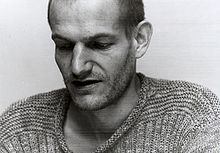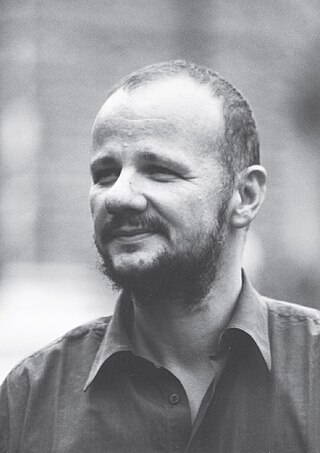
Wolfgang Mitterer (born 6 June 1958 in Lienz, East Tyrol) is an Austrian composer and musician (organ, keyboard).

Wolfgang Mitterer (born 6 June 1958 in Lienz, East Tyrol) is an Austrian composer and musician (organ, keyboard).

Wolfgang Mitterer studied with Otto Bruckner in Graz in 1977, and then from 1978 to 1983 at the University of Music and Performing Arts, Vienna he studied organ with Herbert Tachezi and composition with Heinrich Gattermeyer before working for a year at the studio for electroacoustic music (EMS) in Stockholm in 1983. This was followed by scholarships to Rome in 1988 and Berlin from 1995 to 1996. In 1991 Mitterer founded the Olongapo label. [1]
Mitterer is considered to be one of the most important contemporary Austrian composers and a pioneer in the field of electroacoustic music. He currently does a lot of work together with other artists, frequently with international improvisation and jazz musicians such as Wolfgang Puschnig, Wolfgang Reisinger, Linda Sharrock, Klaus Dickbauer, Sainkho Namtchylak, Tscho Theissing, Tom Cora, Ernst Reijseger, Hozan Yamamoto, Roscoe Mitchell, Georg Breinschmid, David Liebman, David Moss, Max Nagl, Achim Tang, Patrick Pulsinger, Christof Kurzmann, Christian Fennesz, Marc Ducret, Franz Koglmann, Louis Sclavis, Harry Pepl and others.
In addition Mitterer has appeared as an organist, interpreting works by Bach, Messiaen and Ligeti among others. He has played in off locations such as in a quarry and in a disused fortification complex in Tyrol. He has also been involved in the Donaueschingen Festival (Donaueschinger Musiktage), the steirischer herbst and the Darmstädter Ferienkurse (Darmstadt International Summer Courses for New Music). Alongside sound installations and numerous electronic collages Wolfgang Mitterer has also written chamber music, scenic works, also operas, a piano concerto and music for orchestra and organ. In addition he has worked on experimental films, radio plays and theatres, has written live accompaniments to silent movies, but also music for the shows of a fashion designer.
Wolfgang Mitterer has lectured at the Vienna University of Music as well as at the Darmstadt International Summer Courses for New Music. He is a supervisory board member of Austro Mechana.
Wolfgang Mitterer works and composes in the field of collective improvisation music, plays the organ and electronic instruments. The space-relatedness, which he frequently emphasises in his titles, gave works such as "Waldmusik", "silbersandmusik", "Turmbau zu Babel", "horizontal noise", "vertical silence" and "Labyrinth 6–11" a particular character. Sometimes up to 4000 people worked on these; in addition many traditional sounds such as brass bands and choral societies were used. These projects ultimately emerged from Wolfgang Mitterer's recordings in the most diverse musical genres and through joint appearances with representatives of the DJ scene and concerts, also through reinterpretations of classical works from Bach, to Schubert.
Wolfgang Mitterer also works on scenic and dramatic productions, the texts of which he partly collects and adapts himself, such as in "Ka und der Pavian", based on the Egyptian Book of the Dead [2] and in "Massacre", based on religious murders from the 16th century after Christopher Marlowe or the lieder cycle "Im Sturm", based on the lieder of Franz Schubert. In 2004 his performance with dancers, Labyrinth for soprano and electronics, was performed at the Semper Depot of Vienna, by the group DANS.KIAS, choreographed by Saskia Hölbling, and Katia Plaschka, soprano. [3] [4]

{{citation}}: CS1 maint: location missing publisher (link){{citation}}: CS1 maint: location missing publisher (link){{citation}}: CS1 maint: location missing publisher (link)
Isang Yun, or Yun I-sang, was a Korean-born composer who made his later career in West Germany.
Hans Tutschku is a German composer.
York Höller is a German composer and professor of composition at the Hochschule für Musik Köln.

Bernhard Lang is an Austrian composer, improviser and programmer of musical patches and applications. His work can be described as contemporary classical, with roots, however, in various genres such as 20th-century avant-garde, European classical music, jazz, free jazz, rock, punk, techno, EDM, electronica, electronic music, and computer-generated music. His works range from solo pieces and chamber music to large ensemble pieces and works for orchestra and musical theatre. Besides music for concert halls, Lang designs sound and music for theatre, dance, film and sound installations.
Oliver Martin Schneller is a German composer and saxophonist.
Wolfgang Meyer was a German clarinetist and professor of clarinet at the Musikhochschule Karlsruhe. He worked internationally as a soloist, in chamber music ensembles, and in jazz, with a repertoire from early music played on historical instruments to world premieres.
Erich Urbanner is an Austrian composer and teacher.
Paul Angerer was an Austrian violist, conductor, composer and radio presenter.

Gerhard Schedl was an Austrian composer. His works included chamber works, operas, theater pieces, symphonies, concertos, and sonatas.
Eres Holz, is a German composer of Israeli origin. He has been living in Germany since 2003.

Iris ter Schiphorst is a German composer and musician.
Alexander Moosbrugger is an Austrian Composer, living since 2001 in Berlin.

Karola Obermueller is a German composer and teacher.

Mansoor Hosseini is an Iranian-Swedish percussionist and composer of classical music, born in Iran, who studied in Paris and Brussels. His works comprise chamber music and orchestral pieces. He founded the Ensemble Themus in Gothenburg, focussed on theatrical music.

Wolfgang Reisinger was an Austrian jazz percussion player.

Friedrich Schenker was a German avant-garde composer and trombone player.
Thomas Christoph Heyde is a German composer, media artist and curator. He is chairman of the Forum Zeitgenössischer Musik Leipzig.
Péter Kőszeghy is a Hungarian composer and music eductor.
Juliane Klein is a German composer and publishing director.
Helmut Zapf is a German composer.